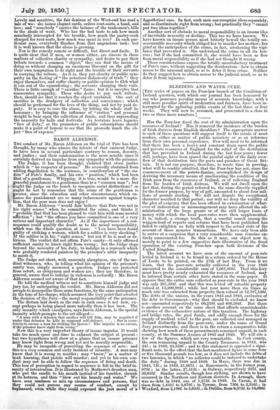BARON ALDERSON.
I TEE conduct of Mr. Baron Alderson on the trial of Pate has been I thought, by many who admire the talents of that eminent Judge, to have been in several particulars contrary to reason, decency,
.,. and justice ; and their condemnation is the more notable since it certainly derived no impulse from any sympathy with the prisoner.
The Judge, it has been thought, violated that stern justice which is "no respecter of persons." He avowedly abstained from adding flagellation to the sentence, in consideration of "the sta- tion" of Pate's family, and his own "position," which had been that of a gentleman. 'Whipping, it is true, would be a more dis- graceful punishment to a gentleman than to a "common man " ; but --Ought the judge on the bench to recognize social distinctions ? or pught he not to remember that the crime of the gentleman is 4reater, since the education and other circumstances which en- liance the punishment are so many inducements against tempta- tion, that the poor man does not erpoy P Mr. Baron Alderson "would fain believe that Pate was not in his right senses" when he committed the crime, and thinks it "probable that God has been pleased to visit him with some mental affliction " ; but "the offence you have committed is one of a very serious and important character." As if the importance of a con- sequence could- qualify the doubt as to the moral responsibility, which was the whole question at issue. "1 ou have been found guilty of striking a woman, which for a soldier is very shock'
If the soldier is in his "right senses," but not if he is mad or e- lirious. The verdict did not affirm Pate's sanity—it only affirmed sufficient sanity to know right from wrong ; but the Judge steps beyond the necessity of his duty, to indulge in a reproach which was probably rendered painless by the prisoner's utter incapacity to merit it •
The Judge out short, with unseemly abruptness, one of the me- dical witnesses, who, in telling what his opinion of the prisoner's sanity was simply answered a question. Judges are protected from retort, as clergymen and women are ; they are therefore, in general, aware that to indulge in rudeness is cowardly : Mr. Baron Alderson seemed not aware of that fact.
He told the medical witness not to constitute himself judge and jury too, by anticipating the verdict. Mr. Baron Alderson did not scruple to monopolize those same functions, by the same anticipation .in the tone of his charge, which assumed the very point that awaited the decision of the Jury—the moral responsibility of the prisoner.
.. The dictum laid down as the rule in such cases is not new, ex- cept perhaps in being placed more nakedly than it has been. The only insanity which exculpates, says Baron Alderson, is the special 'insanity which prompts to the act alleged— "A man with a delusion that another will ldll him, may be acquitted if 'under that delusion he kills in supposed self-defence But is eccen- tricity to excuse a man for striking the Queen ? The impulse is no excuse, if the prisoner knew right from wrong."
• Now this is a very imperfect theory of insane impulse. It would take too much space and time to exhaust the subject at present ; but two hypotheses will show at a glance that an insane prisoner may know right from wrong and yet not be morally responsible.
He may be incapable of perceiving the sequence of acts : and this is a very common and early incident of insanity. A man may know that it is wrong to murder; may "know," as a matter of book learning, that pistols will murder; and yet in his own con- duct may not be able to follow the sequence of firing and death. This loss of perception in to sequence is felt in the brief in- sanity of intoxication. It is illustrated by Mathews's drunken man, who put the candle to his mouth instead of his tumbler, shrunk at its hotness, and then "blew out his brandy and water." We have seen madmen so mix up circumstances and persons, that they could not pursue any course of conduct, except by haphazard, even while they could expound the just moral of a hypothetical case. In fact, such men can reoognize ideas separately, and so discriminate right from wrong; but practically they "cannot put two ideas together." Another sort of obstacle to moral responsibility is an insane idea of inevitable necessity or destiny. This too we have known. We have known an insane person most bitterly bewail the totdlly un- accountable necessity-which obliged her to murder her mother; her grief at the anticipation of the crime, in fact, awakening the vigi- lance that prevented it. She understood the crime in all its hor- rors; but if she had committed it, she would have been as free from moral responsibility as if she had not thought it wrong.
These considerations expose the totally unsatisfactory treatment of Pate's case, without suggesting the desideratum—how to obtain access to the unsound mind, so as to deter it from crime. Neither do they suggest how to obtain access to the judicial mind, so as to deter it from injustice.


























 Previous page
Previous page